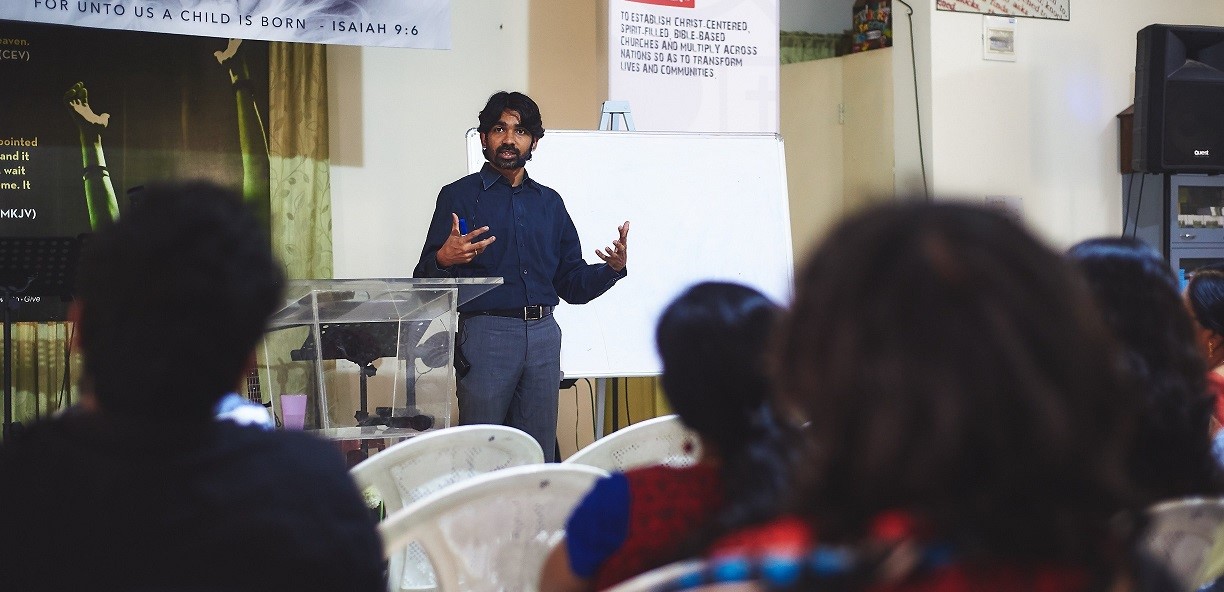What is a true church – Ps. Suresh

The preacher told us that this sermon would be radically different from what he thought about church previously or what we generally assume. He said that we should go to Bible and see for ourselves what is a true church.
He asked us to imagine apostle Paul coming to our church and what he would think of all the paraphernalia. We were asked to compare the earlier church with the church today in terms of the principles we follow. Today, we come and confess things in church but our lives do not reflect those things. One person performs and the others sit and watch. When people get emotionally moved, they feel God had spoken to them.
Some may argue that we need all this to have orderliness in church but it is important that opportunities are available for all to contribute. Our church is trying to involve everyone in Sunday service and everyone must come to give and also receive.
We went through some scriptures that talk about church service. 1 Corinthians 14:26 tells us about the different ways each one of us can encourage the other believers. Just a smile, greeting, or word is enough to encourage the other person. God can enable us to encourage each other. Let us remember that we come to church not for grand knowledge but to build each other up.
Acts 2:42-47 describes the first century church where there was teaching, fellowship, prayer, and breaking of bread. People of the world will be drawn to the gospel if they see the church living a godly life (just like the early church did).
The preacher gave some examples of churches where it’s mainly instruments, performance, show and so on but these did not transform lives. Let us not focus on putting up a show because better entertainment is available outside. We need to examine our priorities and where we stand as compared to the first church.
Church is an extended family. As an NLF church grows beyond 50, we split. Smaller number ensures that we individually pay attention and know each other. We may not like each other but are to love each other. Love accompanies sacrifice. Christ did that for us and we are called to do the same for each other. That is how a church family is formed. If this love is present, there is commitment. The church is a very diverse family: We don’t have the same wealth or social status, people who don’t agree with each other but all have the same allegiance to Christ.
Ephesians 5:19-21 guides us about the ideal behavior in church. We are told to submit to one another. But some churches are run as businesses to grow funds and get more people while some have ensure members get an emotional high and feel good when they hear music or expounding of scripture. If your life is stagnating, something is wrong with your attitude to church or the church itself. You need to grow in Christian life and cannot remain in one place.
– No honorific titles and heirarchy is required in church. Jesus despised all three outwardly signs and shows of authority. – Some church leaders want to attract a group of people by dressing in a certain manner. They resort to various gimmicks to attract people to church. Church has to be attractive by the life of people in it. We have to attract people to Christ and not to us.
Somewhere in church history there was a divide between clergy and laity. This brought in a huge flaw in church. It assumes that only a few people are ordained to do God’s work while the others came only to receive. Christ died on the cross to remove the divide between God and people where only priests could approach God on their behalf. Humans love hierarchy but it leads to control and manipulation. We only need to go through the church history to know how the various man-made principles crept into the church. For example, there are assumptions that only senior pastors can baptize.
In our church, two seniors pray and break the bread. We are heavily dependent on church elders but the church must be able to function independently. Why is the bread and wine covered with white cloth? A red velvet bag with handle to collect money? People are scared of the pulpit and coming there and talking. They get intimidated by the holy aura and believe only the clergy has all spiritual gifts and talents.
The entire church has to be involved in building each other. We encourage all church members to be a part of the ministry team so all can exercise their gifts. Every believer is a priest and their is no chief/high priest except Jesus. Pastor is not holy but is human too. When he errs, do not be disappointed.
There is leadership for maintaining orderliness but they are for serving and not for ordering people around. If a minister is a celebrity, it against the principles of Christ. Jesus was not a celebrity minister. We are the problem as we follow people. A famous preacher visits church and lots of people come that day. Hero worship! The biggest grosses in Hollywood are superhero movies but let us remember that no pastor, leader, or person can be a hero. We tend to put people on a pedestal. If we idealize people and they make mistakes, were are heartbroken. Another habit that people have is chasing prophets. It’s God who speaks through them. No harm in listening but we don’t need to go crazy.
The above is overt but other subtle ones are when a great preacher is coming. Will God speak only through him? He spoke through a donkey. Depends on where your heart is! If you know a person well, they can speak to your life more than some random celeb speaker.
The preacher spoke about the role of elders in church. They are servant leaders who have to earn their right to teach, preach and correct. They must lead by example, follow Jesus, and serve people.
A church is essentially the people in church and not the building, things, and rituals. If the church is not speaking to people’s lives, there is no point in it’s activities. The sad truth is we tolerate unrepentant sin in church today. There are fights between denominations over peripheral doctrines.
The preacher exhorted us to review the state of the modern church in light of the scriptures and to reconsider our attitude too.
Sermon Reflections by Sis. Shuba Ja
